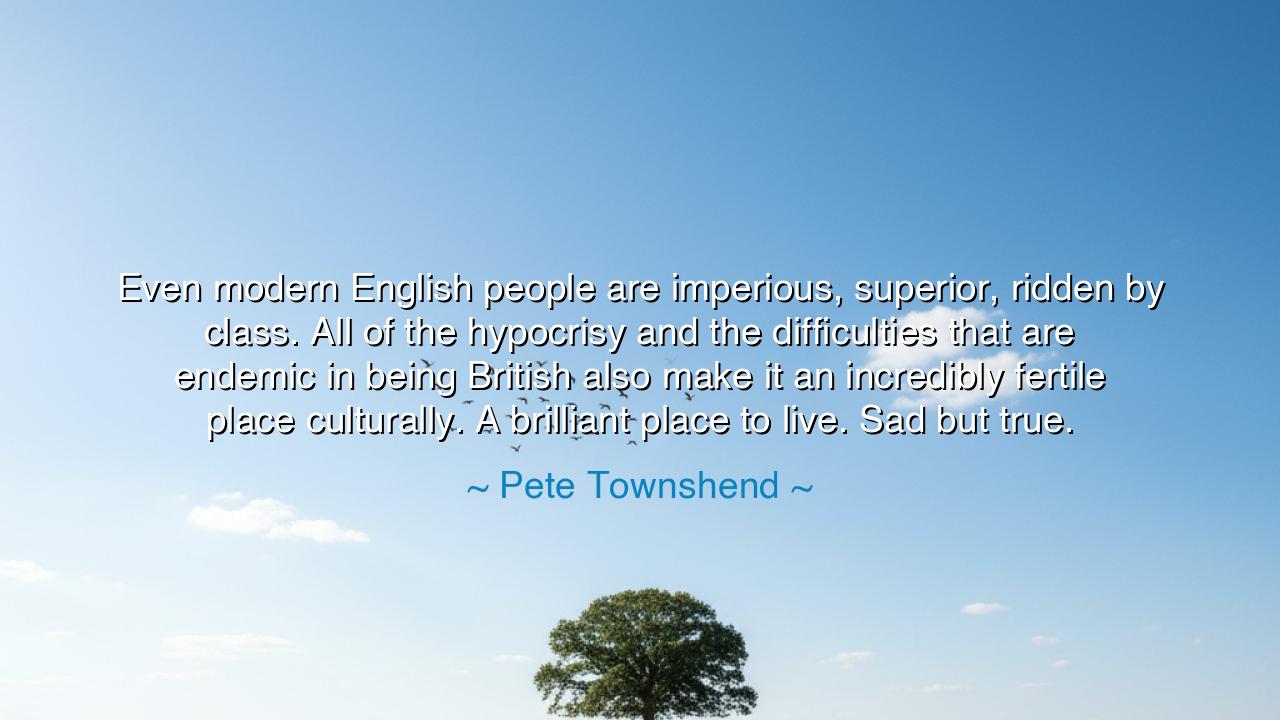
Even modern English people are imperious, superior, ridden by
Even modern English people are imperious, superior, ridden by class. All of the hypocrisy and the difficulties that are endemic in being British also make it an incredibly fertile place culturally. A brilliant place to live. Sad but true.






“Even modern English people are imperious, superior, ridden by class. All of the hypocrisy and the difficulties that are endemic in being British also make it an incredibly fertile place culturally. A brilliant place to live. Sad but true.” — so spoke Pete Townshend, and in his words we hear the paradox of a nation and its people: both wounded by their history and ennobled by it, both bound by chains of hierarchy and liberated by the brilliance such struggle produces.
The English, he says, are marked still by imperious airs and the shadow of superiority, the inheritance of an empire that once ruled seas and continents. To be “ridden by class” is to live with invisible barriers, where accent, schooling, and birth still shape destiny. And yet, from these very difficulties arises a strange vitality. The pressure of hypocrisy, the contradictions of pride and shame, forge not only division but art, literature, and song that cut to the very heart of the human condition.
History gives us many mirrors for this truth. Consider Charles Dickens, who grew up in poverty yet wrote novels that exposed the cruelty of the class system while celebrating the resilience of the poor. From the hypocrisy of a society that claimed morality but allowed suffering came stories so alive with truth that they reshaped conscience itself. The soil was bitter, yet the harvest was sweet. Townshend’s reflection is of the same spirit: that the very flaws of a people are what drive their genius.
The origin of this paradox lies in Britain’s long history. The empire bred arrogance, yes, but also global exchange. The rigid structures of monarchy and class created injustice, yet also stirred revolutions of thought, from the Chartists to the suffragettes. Out of hypocrisy arose satire; out of division came music that crossed barriers, from folk ballads to punk rock. Townshend, himself a son of this tradition, knew firsthand that the difficulties of being British fed the fire of The Who’s anthems—songs of rebellion against the very forces that constrained them.
And yet he calls it sad but true. For while brilliance arises from struggle, the struggle itself is painful, unnecessary in its cruelty, and exhausting to endure. To be shaped by hypocrisy is not to be freed of it. The artist may transform it, but the people still bear its weight. This is the bittersweetness of Townshend’s words: he acknowledges the cultural fertility born of these contradictions, but he does not excuse them. They are both wound and gift, curse and source of greatness.
The lesson is clear: out of contradiction, beauty can be born. Yet we must not romanticize the wounds that create it. Recognize the hypocrisy and divisions in your own culture, your own time, and see how they might drive you not to despair, but to creation. Let struggle become the furnace of your voice, as it became for Dickens, for Orwell, for The Beatles, for The Who. But also seek to heal what is broken, so that future generations might create not only from wounds but from wholeness.
Practical action follows: look at the difficulties and hypocrisies of your own society. Do not turn away from them in shame or denial. Speak them, write them, sing them. Transform them into art, into reform, into action. And when you find yourself tempted to despair, remember Townshend’s paradox: even in the most rigid and flawed systems, there lies potential for brilliance. The key is to refuse silence.
Thus Pete Townshend’s words endure as both critique and celebration. The English spirit may be weighed down by class and imperious airs, but it is also alive with resilience, satire, rebellion, and art. This is the eternal paradox of humanity itself: that our greatness often grows from our flaws. Sad but true—yet also hopeful, for if beauty can rise from brokenness, then perhaps one day wholeness will yield wonders even greater.






AAdministratorAdministrator
Welcome, honored guests. Please leave a comment, we will respond soon